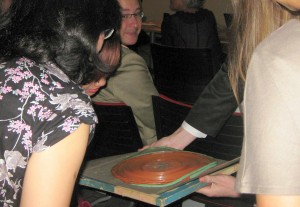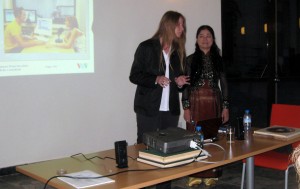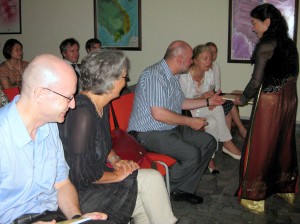Asian and German experts make sound archives accessible for journalists
Journalists who want to add archived sound material to current affairs stories usually have one big problem: how can they find relevant material in a broadcaster’s archive?
For the keepers of these archives, it’s a challenge to catalog sound material so that it’s easily accessible to journalists. And if the material is on tape or analogue disks, the archive workers also have to find ways to restore and digitize the carriers. Tapes deteriorate easily – especially in tropical climates.
These are key issues that Heidrun Speckmann and Nguyen Pham Hoa Binh (free media consultant in Vietnam) discussed with an international audience at the German Embassy in Hanoi on May 8th, 2012. Heidrun Speckmann has been working as CIM integrated expert and DW Akademie’s Media Archive Developing Consultant at Radio The Voice of Vietnam (VOV) since September 2009.
At the German Embassy, the two archive experts presented their long-term consulting projects aimed at modernizing the sound archives of Asian broadcasters. These projects are financed by Germany’s Federal Ministry for Economic Cooperation and Development (BMZ).
Easier for journalists to find archive material
In their presentation, Heidrun and Binh showed how VOV’s analog audio archive has been modernized and how VOV journalists can now easily use archive material for their productions.
“What used to be a time-consuming search for material with a card catalog has now turned into a browser-based research database, in which journalists can listen to the audio clips at their workplace before producing a new piece,“ said Heidrun Speckmann.
“Thanks to the modernization of the archives, more pieces of audio material are available to the journalists. The range of the retrieved material is much higher than before, since the content is more easily searchable.” Heidrun added that the immediate access to the archive material also allows journalists to make better use of contemporary sound documents for the current programs and to produce program formats with more audience participation.
Besides presenting several acoustic samples to the guests at the German Embassy, Binh and Speckmann also showed two original tapes which illustrated the severe damage that years of storage in a tropical climate have caused.
Thanks to the training by DW Akademie’s team of experts, VOV archivists are now able to physically restore such tapes and digitize them.
Asians helping Asians
Since the VOV archive experts have learned a lot in the process of modernizing their own archives, they are now qualified to help train archivists at other Asian radio stations. Together with the team of DW Akademie experts, they have begun long-term training projects in Sri Lanka and Nepal. The archiving project with Radio Nepal in Kathmandu started in 2009, the one with Sri Lanka Broadcasting Corporation in Colombo in 2010.
As Heidrun Speckmann explained during her presentation in Hanoi, it was a special highlight for the heads of the digital archive projects from all three of these Asian broadcasters to join her at the IASA (International Association of Sound and Audiovisual Archives) in Frankfurt in 2011. The German-Asian team had been invited to present their long-term project to modernize broadcasting archives in Asia and to make them accessible to journalists and the public at large.
For more information check out these articles (in German only)
– Deutsche Expertin bei VOV stellt Audio-Archiv-Projekte in Asien vor
– Deutsche Experten helfen VOV bei der Digitalisierung von Audioarchiven
– Veranstaltungsreihe: Was macht eigentlich …? – Deutsche Experten in Vietnam berichten






